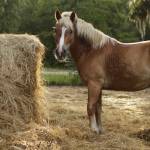Feeding Ponies: Gauging Owner Confidence

Equine obesity is at an all-time high, particularly in certain breeds, such as the native ponies of Scotland. A survey of 571 pony owners, half of whom had 20 or more years of experience in the equine industry, found that self-reported confidence in horse husbandry did not translate into effectively implementing weight management approaches.
This survey is important to horse owners and veterinarians because obesity is a true welfare issue, unquestionably linked to life-threatening laminitis as well as reproductive, musculoskeletal, and cardiovascular problems.
“Despite increased attention and education efforts regarding obesity and weight management over the past several years, studies have not found any decline in the prevalence of obesity,” said Ashley Fowler, Ph.D., a nutritionist for Kentucky Equine Research.
A study was designed to better understand the attitudes and behaviors influencing owner decision-making for certain feeding and management practices.*
Based on the answers to 77 survey questions, the researchers uncovered two particularly important details:
First, the more years of experience an owner had with native ponies, the more confidence they had in management and disease identification. However, this confidence did not increase the likelihood that owners would use weight management approaches.
Weight management approaches include:
- Monitoring body condition routinely;
- Providing appropriate preserved forage, such as those low in nonstructural carbohydrates (NSC) and in appropriate amounts to induce weight loss;
- Promoting seasonal weight loss (i.e., weight loss in the winter); and
- Exercising horses, which has beneficial effects on insulin sensitivity.
“Years of experience had a negative direct effect on owners’ likelihood of employing these approaches related to forage provision and exercise,” wrote the researchers.
“This finding was surprising, as one would expect that years of experience would increase the likelihood of using specific weight management practices. Perhaps there is a disconnect between education efforts and practical application,” suggested Fowler.
Second, survey respondents who managed ponies with special dietary requirements (i.e., those with laminitis or equine metabolic syndrome) were more likely to use weight management approaches.
“Management-based interventions were most likely to be applied after the development of disease, whereas they would be more beneficial if used in a preventative capacity,” the researchers noted.
“These data show that veterinarians and nutritionists need to continue to find key motivators that would effectively encourage owners to address obesity preventatively before overt disease develops,” Fowler said.
Although this study was specific to native ponies in Scotland, ponies and horses elsewhere in the world are suffering similar obesity-related issues, putting them at risk for equine metabolic syndrome, insulin dysregulation, and laminitis.
“One of the weight management approaches mentioned in the study, lowering NSC intake, can be achieved either through sourcing low-NSC hay or soaking hay to reduce NSC content. Soaking hay can increase losses of other key nutrients, so make sure to include a ration balancer or vitamin and mineral supplement to ensure your horse’s nutrient requirements are being met,” Fowler advised.
*Ward, A.B., P.A. Harris, C.M. Argo, C.A. Watson, N.M. Burns, M. Neacsu, W.R. Russell, D. Grove-White, and R.K. Morrison. 2023. Confidence does not mediate a relationship between owner experience and likelihood of using weight management approaches for native ponies. PLoS One 18(10):e0292886.








